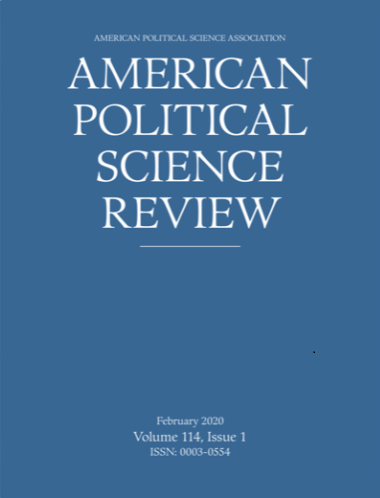理智,做出选择:平民如何在暴力中选择生存策略
IF 5.9
1区 社会学
Q1 POLITICAL SCIENCE
引用次数: 0
摘要
在激烈、令人吃惊的政治暴力事件中,普通人如何选择生存策略?为什么一些人逃离暴力,而另一些人则反击、适应或躲藏?暴力事件中的个人决策会产生巨大的政治影响,但人们对其了解甚少。我提出了一种决策理论,重点关注个人对暴力环境的可控性和可预测性的评估。我运用我的理论--情境评估理论来解释印度锡克教徒在 20 世纪 80-90 年代旁遮普危机和 1984 年反锡克教大屠杀期间的选择。通过对 509 份口述历史的原始访谈以及定性和机器学习分析,我发现控制和可预测性评价会影响策略选择。认为对威胁的控制力 "低 "的人通常会回避威胁,而不是接近威胁。认为威胁演变的可预测性 "低 "的人更喜欢更具破坏性的策略,而不是温和的风险监控选择。即使考虑了个体人口统计学和冲突特征,评价也能解释行为的变化,还能解释生存策略随时间的变化。本文章由计算机程序翻译,如有差异,请以英文原文为准。
Making Sense, Making Choices: How Civilians Choose Survival Strategies during Violence
How do ordinary people choose survival strategies during intense, surprising political violence? Why do some flee violence, while others fight back, adapt, or hide? Individual decision-making during violence has vast political consequences, but remains poorly understood. I develop a decision-making theory focused on individual appraisals of how controllable and predictable violent environments are. I apply my theory, situational appraisal theory, to explain the choices of Indian Sikhs during the 1980s–1990s Punjab crisis and 1984 anti-Sikh pogroms. In original interviews plus qualitative and machine learning analysis of 509 oral histories, I show that control and predictability appraisals influence strategy selection. People who perceive “low” control over threats often avoid threats rather than approach them. People who perceive “low” predictability in threat evolution prefer more-disruptive strategies over moderate, risk-monitoring options. Appraisals explain behavior variation even after accounting for individual demographics and conflict characteristics, and also account for survival strategy changes over time.
求助全文
通过发布文献求助,成功后即可免费获取论文全文。
去求助
来源期刊

American Political Science Review
POLITICAL SCIENCE-
CiteScore
9.80
自引率
5.90%
发文量
119
期刊介绍:
American Political Science Review is political science''s premier scholarly research journal, providing peer-reviewed articles and review essays from subfields throughout the discipline. Areas covered include political theory, American politics, public policy, public administration, comparative politics, and international relations. APSR has published continuously since 1906. American Political Science Review is sold ONLY as part of a joint subscription with Perspectives on Politics and PS: Political Science & Politics.
 求助内容:
求助内容: 应助结果提醒方式:
应助结果提醒方式:


